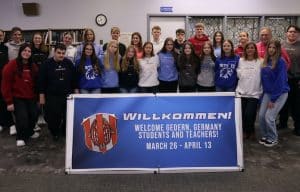Proposed Columbia tax to go toward projects
Dozens of citizens turned out for a public information session March 10 to learn more about a small sales tax Columbia voters will be asked to approve when they visit the polls on April 7.
Proceeds of the proposed tax will be used to pay for a slew of infrastructure projects that otherwise don’t have a consistent source of funding.
“We don’t have a dedicated revenue stream specifically for streets, sidewalks, bridges and parks,” city administrator Jimmy Morani said.
The proposed tax is a non-home rule sales tax, which would apply an additional .25 percent tax to eligible merchandise. It would not apply to groceries, prescription and non-prescription medications and medical supplies, or personal property that is titled or registered like cars, boats, trailers and aircraft…>>>
The tax would amount to an additional one penny for every $4 spent, bringing the city’s sales tax rate to 6.75 percent. According to information distributed by the city and available on the city’s website, that leaves Columbia’s sales tax rate below that of South St. Louis County and Fairview Heights.
“This is a tax that will ease the burden on local property owners,” Morani said. “It will not fall entirely on local citizens.”
Instead, shoppers passing through, using Columbia’s roads and sometimes emergency services, will carry some of the burden of the tax as they shop and eat at restaurants within the city.
And as funding from the state continues to shrink and lag behind, even as senators and representatives hand down new rules on what municipalities must do but offer no provisions for how to pay for them, such taxes can offer communities a way to maintain high quality levels of services and infrastructure.
City officials have begun to compile a list of projects that will be considered if the tax, which is expected to bring in about $160,000 per year beginning in April 2016, is approved.
High priority projects like reconstructing the intersection of Ghent Road and North Main Street, the realignment of Gall Road at South Main Street, and installing sidewalks along Veterans Parkway and Centerville Road, would likely not be possible without these additional funds, or would take until into the 2020s to see any traction.
“There’s just not adequate revenue in the existing funds to be on the level of services the citizens expect,” Morani said.
If the tax is approved, the city council will have the option of issuing bonds to bring in additional funds for the projects. And with interest rates historically low, Morani said that, as city administrator, he will recommend the council seriously explore this option. This would further allow the city to apply for grants to assist with the funding of some of the projects. Because while grants provide needed funding, they usually require the city to put up some of its own money in the form of matching funds.
For example, the Gall Road intersection, which is considered a high priority project because of the availability of grants, would be on a timeline that wouldn’t see any work take place until into 2019 at the earliest, if the tax is not approved. This is because, without funds from the tax, 2019 is the soonest the city would be able to come up with its matching portion — even though it’s only 20 percent of the project’s total cost.
Gall Road work is one of the few projects on the city’s radar that is eligible for a grant. Most of the work that would be funded by the tax is usually not eligible for grants, making the price tags unrealistic for the city considering the current economic situation of the state of Illinois.
Anyone wanting additional information about the tax, proposed projects or other related issues can visit the city’s website at www.ColumbiaIllinois.com, or they may contact Morani directly at 281-7144, extension 122 or jmorani@columbiaillinois.com.






